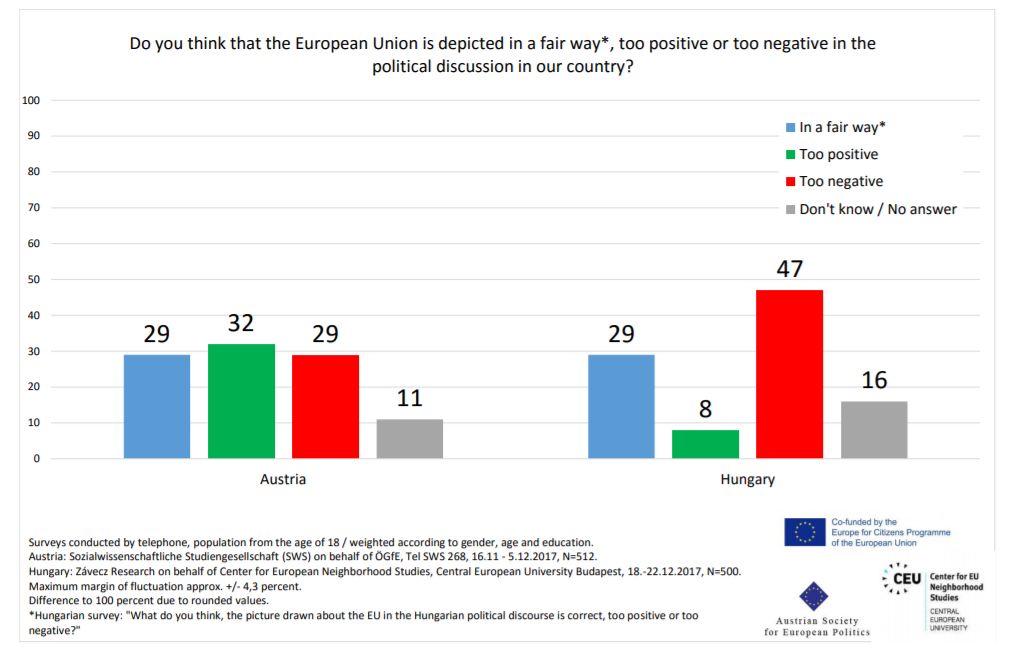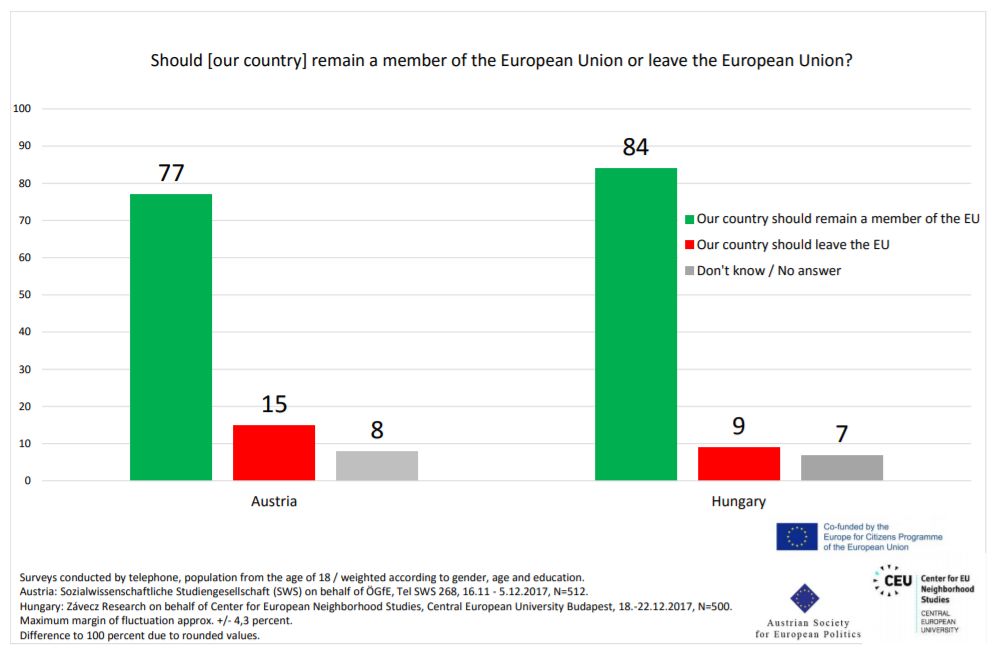On Sunday, April 8, Hungarians elect a new parliament. An important date in particular for Hungarians, but interesting also to Austrians and beyond. Hungary and Austria have traditionally strong relations, which became even closer with EU membership. There are, however, considerable differences between Budapest and Vienna when it comes to their views towards the EU and its institutions, as well as democratic values. Consensus and dissent in the neighbouring countries are also reflected in public opinion, as two surveys commissioned by the Austrian Society for European Politics and the Central European University Budapest, and its Centre for European Neighbourhood Studies, show.
While for many in both countries superficial ‘EU bashing’ seems to be a raison d’etre, EU membership is undisputed – in Hungary even more so than in Austria: 77 per cent of Austrians and 84 per cent of Hungarians want their country to stay in the EU. Only 15 per cent of Austrians and 9 per cent of Hungarian respondents would prefer exiting the Union.
As many as 47 per cent of Hungarians and 29 per cent of Austrians state that the EU is depicted too negatively in the national political discussion, while 32 per cent of Austrians and only 8 per cent of Hungarians claim the opposite. In both countries, 29 percent of respondents say that the Union is treated fairly.
When it comes to questions of asylum and migration, Budapest in particular pursues a rather confrontational rhetoric towards European institutions while Vienna has tried to act in a more consensual manner. In both countries though, people seem convinced that politicians vent people’s anger on ‘Brussels’ to cover their own mistakes.
More than two-thirds of Hungarian respondents (69 per cent) and more than half of Austrians (57 per cent) agree with the statement that “the EU often is used as a scapegoat used by our politicians to detract from their own shortcomings,” while 23 per cent of Hungarians and 36 per cent of Austrians reject that view. Moreover, nearly two in three respondents in both countries say that the Union is playing a positive role concerning mutual understanding and cooperation between the member states.
As a result of the multiple crises the European Union and its members have had to face in the last decade, and the challenges of an ever globalising world, trust in politics and democracy – at the European as well as the national level – has been steadily declining. A trend which is also reflected in our surveys: 74 per cent of Hungarians and 61 per cent of Austrians perceive a gap between the views of ‘ordinary’ citizens and the political elites. In both countries respondents call for a “strong political leader” – although to a very different extent – 88 per cent of Hungarians and 58 per cent of Austrians would support such a leader.

At the same time, respondents overwhelmingly value ‘democracy and human rights’: 83 per cent of Austrians and 70 per cent of Hungarians say these are ‘very important’ for them personally. The same goes for an independent justice system: held in high esteem by 82 per cent of Austrians and 68 per cent of Hungarians. An independent media and civil society are ‘very’ important for 66 per cent of Austrians and 59 per cent of Hungarians.
The results show the need for an honest, fact-based debate, which allows for positive connotations as well as criticism where appropriate. Despite apparent deficiencies, the European Union does have a positive image – much more than the tabloid press often insinuates. Instead of intensifying nationalistic and populist rhetoric, efforts should be made to strengthen cross-border cooperation and the Union’s global standing. Democracy and democratic values are achievements we should not play with lightheartedly. The need to improve mutual understanding is also reflected by the following numbers: both Austrians (86 per cent) as well as to a certain extent Hungarians (65 per cent) are convinced that their country plays a rather positive role when it comes to solidarity with other member states. Evidence for the need to intensify intra-EU dialogue and listen more closely to each other – which holds true for the Austrian as well as the Hungarian neighbour.
—
The views expressed in this opinion editorial are the author’s own and do not necessarily reflect Emerging Europe’s editorial policy.


